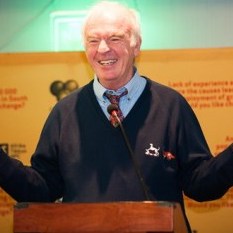
Lifestyle/Community

Raising flags in SA for different scenarios
MICHAEL BELLING
PHOTOGRAPH: WESLEY POON
The other two possible scenarios, or flags, as he calls them, are South Africa as a failed state, or “playing in the second division – a gentler meander downwards”, he said. The probability of this is as great as remaining in the premier league.
Sunter, a former director of Anglo American who was known for his high road-low road scenarios for South Africa before the end of apartheid, said the country is at an economic crossroad and that we need to do things differently to prosper in the future. We need to watch the “rising flags”, particularly relating to the economy, he noted.
The point of flags is to try to see things differently.
The country needs a conversation on boosting the economy and creating greater economic freedom and encouragement for entrepreneurship, he said. The political revolution has occurred and now economic change is required, for example, with young people creating jobs, rather than simply finding jobs. The world of work has changed.
Five rising flags should be noted in this country:
- Corruption and crime – corruption is “changing the game”;
- The declining quality of infrastructure, particularly electricity and water;
- Leadership, particularly inclusive leadership. “South Africa is probably more divided now as a nation than at any time since 1994,” he said;
- Pockets of excellence that exist in many places, “a green flag”;
- The “entrepreneurial spark flag” – that is what changed nations more than anything else.
“We must change our mantra for 2020 from creating five million jobs to creating one million entrepreneurs,” he said.
“I would like to see some kind of economic Codesa to turn things round.”
On the international front, a number of flags indicate threats on several levels. The first is the religious flag, a growing confrontation between the major religions. “The Arab Spring has turned into the Arab nightmare,” which also includes Sunni versus Shia.
“The world is more dangerous now than in 1990,” he said. This is a “cloudy flag”, as we do not know where it is going to lead to.
The second flag is an existential threat to the West, illustrated by Russian President Vladimir Putin’s annexation of the Crimea. This has resulted in concerns in Western Europe about Russian ambitions.
The third flag is a “clockwork flag”, a grey flag ticking away – the ageing of the population in the West and China – but not in Africa.
Middle-class anger at the super rich is another flag. The level of inequality in Europe and the US “is back to where it was in the 1880s” and it was the middle class that produced revolutionaries.
The last flag, another “clockwork flag”, includes threats such as international terrorism and climate change, including changing weather patterns and rising sea levels.
In his introduction, Afrika Tikkun CEO Marc Lubner said his organisation has a business model designed to assist beneficiaries “from cradle to career”, to give them the skills to be employed after finishing school – not just getting them into jobs, but into jobs for which they were well-suited and trained.
This is also done on a professional basis that brings in income for Afrika Tikkun, as opposed to it being only a charity.
Afrika Tikkun has over 20 000 beneficiaries, he said.





David Abel
July 30, 2015 at 3:01 pm
‘SA will soon maintain (or regain?) its status of playing in the \”premier league\” by arresting its economic downward spiral through the re-invention of its energy structures and methodology.
\n
\nThere is a \”pocket of excellence\” right here in SA – an \”entrepreneurial spark plug\”, to use Clem Sunter’s terminology – that is going to change the way the world generates and uses electricity.
\n
\nThat \”green flag\” will impact hugely (and beneficially) on every level and strata of the socio-economic fabric of our society.
\n
\nWATCH THIS SPACE!’